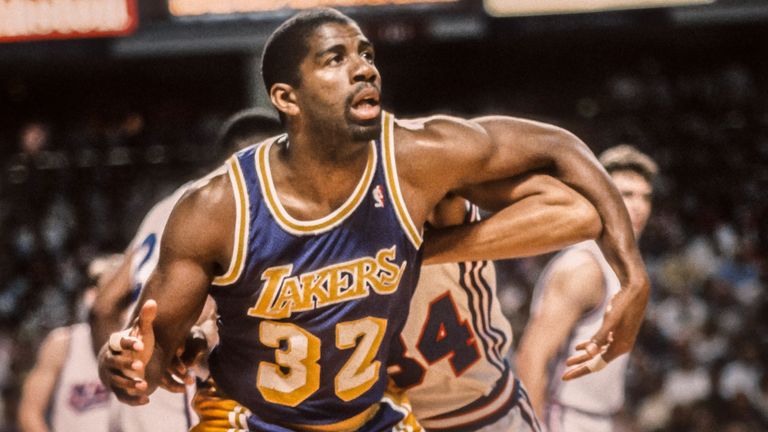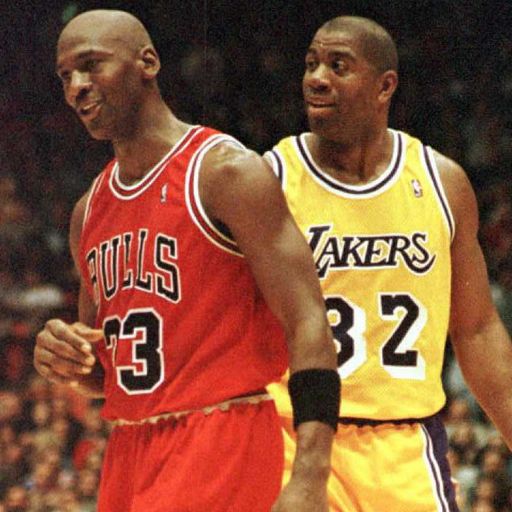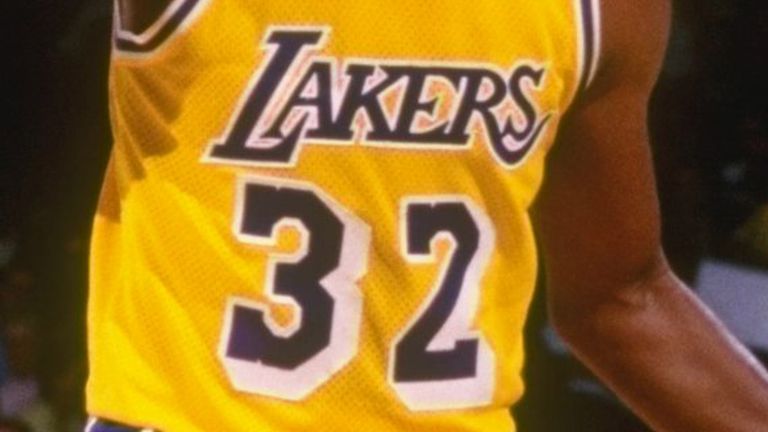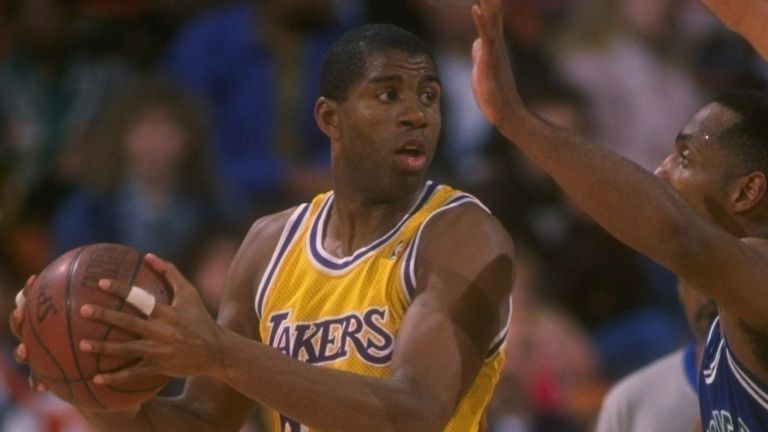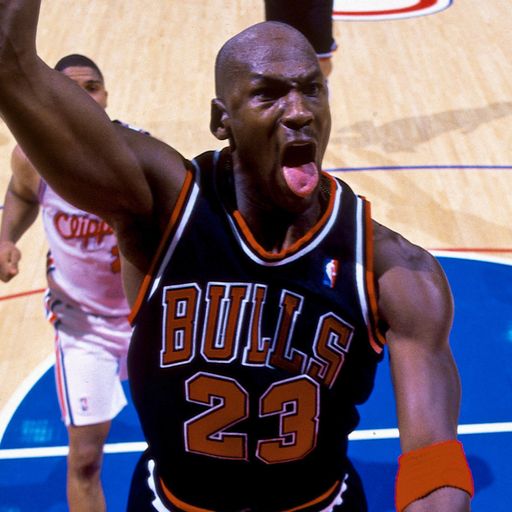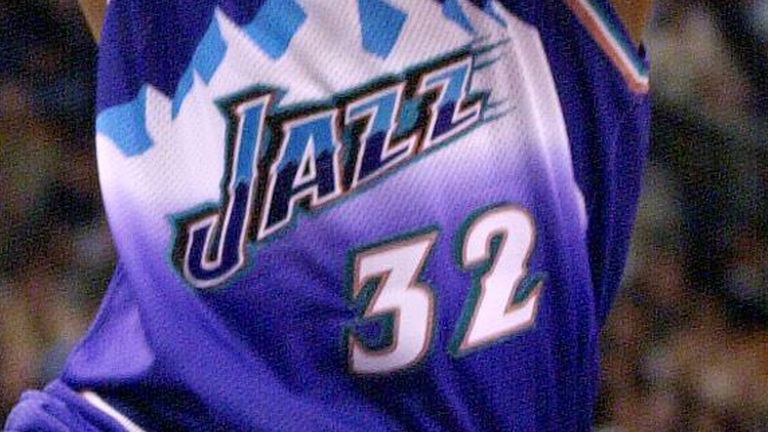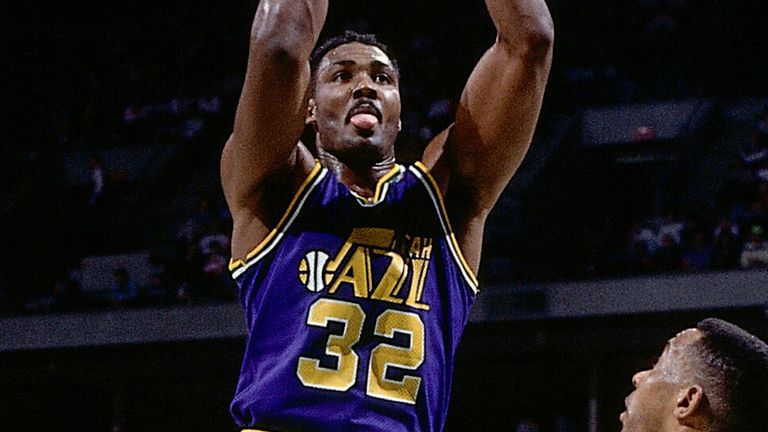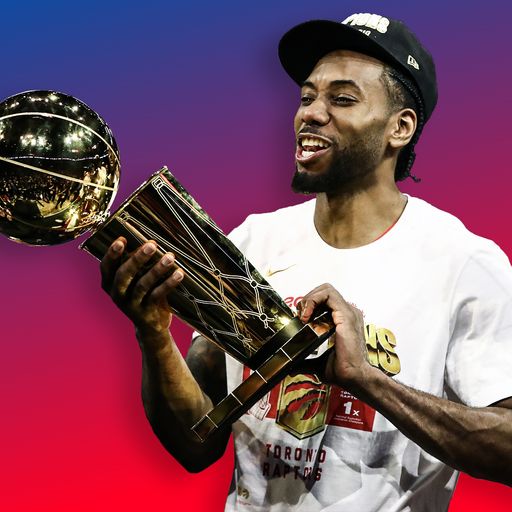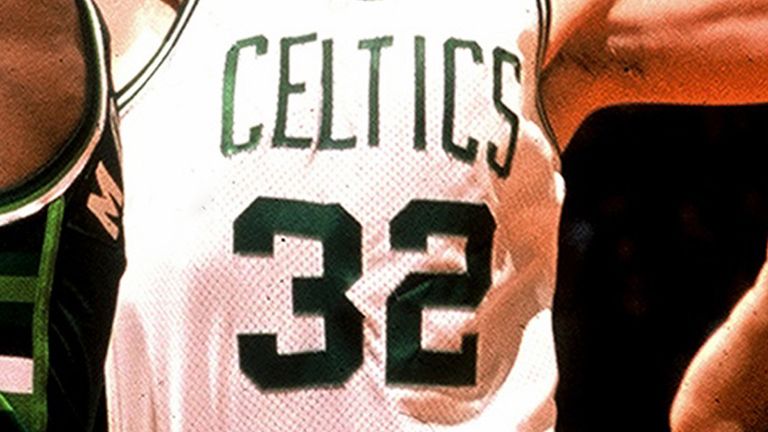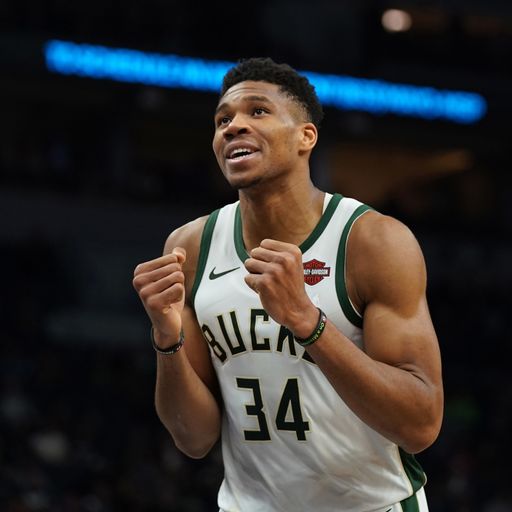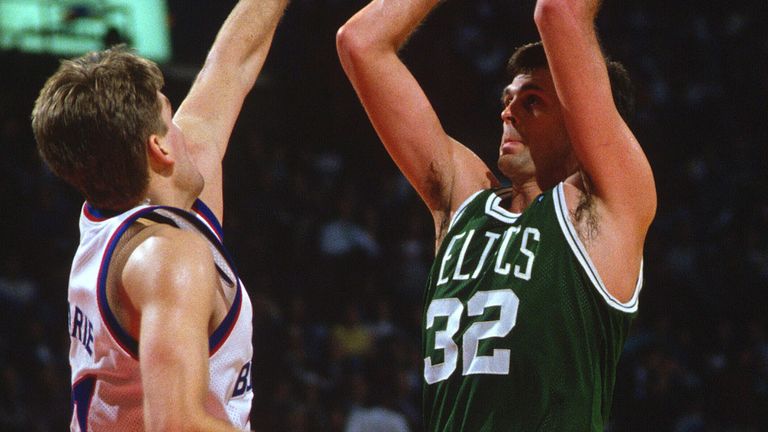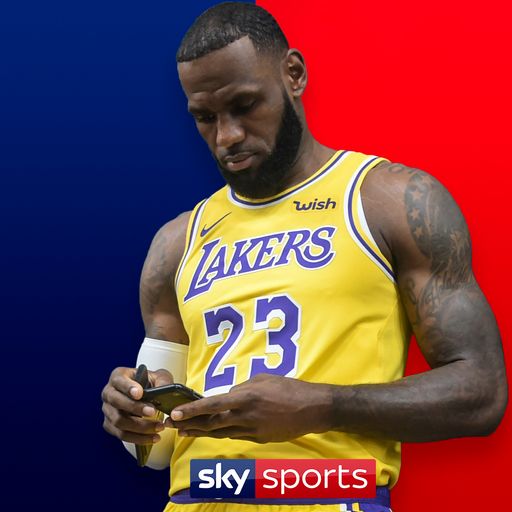Iconic NBA numbers: #32 – Magic Johnson, Karl Malone, Kevin McHale
Friday 15 May 2020 09:47, UK
Thanks to the achievements of the players who wore them, certain NBA jersey numbers have become synonymous with championship wins, MVP victories and spectacular scoring feats.
With the 2019-20 NBA season on hold for the foreseeable future, it is an opportune moment to explore a selection of the NBA's most iconic numbers.
In the latest feature in our series, we take at look at three of basketball's greatest players, all of whom wore No 32.
Magic Johnson
Few athletes are truly unique, changing the way their sport is played with their singular skills. Earvin 'Magic' Johnson was one of them. He was what Bob Cousy was to the 1950s, what Oscar Robertson was to the 1960s, what Julius Erving was to the 1970s.
Johnson was even more than a revolutionary player, who, at 6ft 9in, was the tallest point guard in league history. His sublime talent elicited wonder and admiration from even the most casual basketball fan.
Trending
- World Darts Championship LIVE! Clayton in action after Rock races through
- Double blow! Sterling out 'for a while' - so will Arsenal sign a winger?
- Transfer Centre LIVE! Howe reluctant to sell Dubravka in January
- Saka out for 'many weeks' with hamstring injury
- Usyk vs Fury 2: Fury 'robbed'? What do the stats reveal?
- World Darts Championship schedule: Cross headlines Monday's action
- Liverpool latest: Van Dijk plays down quadruple talk
- 'Cultural overhaul needed' | Neville slams 'mediocre' Man Utd
- Ref Watch: Pickford and Estupinan lucky to avoid unwanted Christmas cards?
- EFL latest: Sheff Utd takeover complete | Northampton appoint Nolan
Whether it was a behind-the-back pass to a streaking James Worthy, a half-court swish at the buzzer or a smile that illuminated an arena, everyone who saw Johnson play took with them an indelible memory of what they had witnessed. From the moment he stepped onto the court, people pondered: How could a man so big do so many things with the ball and with his body? It was Magic.
Johnson accomplished virtually everything a player could dream of during his 13-year NBA career, all of which was spent with the Los Angeles Lakers. He was a member of five championship teams. He won the Most Valuable Player award and the Finals MVP award three times each.
He was a 12-time All-Star and a nine-time member of the All-NBA First Team. He surpassed Robertson's career assists record, a mark he later relinquished to John Stockton. He won a gold medal with the original Dream Team at the 1992 Olympics in Barcelona.
Johnson did all of this while maintaining a childlike enthusiasm born of a pure love of sport and competition. Beyond all the money, success and fame, Johnson was just happy to be playing basketball.
If there was one aspect of Johnson's game that awed people the most, it was his brilliant passing skills. He dazzled fans and dumbfounded opponents with no-look passes off the fastbreak, pinpoint alley-oops from halfcourt, spinning feeds and overhand bullets under the basket through triple teams. When defenders expected him to pass, he shot. When they expected him to shoot, he passed.
Former Lakers swingman Michael Cooper said: "There have been times when he has thrown passes and I wasn't sure where he was going. Then one of our guys catches the ball and scores, and I run back up the floor convinced that he must've thrown it through somebody."
Karl Malone
Karl Malone is arguably the greatest power forward of all time. Built more like a tight end than a basketball player, his size and strength made him difficult to defend in the low block, but he also filled the lane on the fast break and shot a deadly medium-range jumper. The two-time MVP finished his career with 36,928 points second only behind Kareem Abdul-Jabbar.
He also attempted more free throws and grabbed more defensive rebounds than any player in NBA history. He was also selected to the 50th Anniversary All-Time Team and won two Olympic gold medals. As a player who consistently delivered on the court, he deserved the nickname of 'The Mailman'.
Malone will also be forever linked to Utah Jazz team-mate and point guard John Stockton. The two formed the most consistent guard-forward combination in NBA history. Stockton was drafted by the Jazz in 1984 and the subsequent year the team drafted Malone. The two played together for the next 18 years, never missing the postseason. The two were so intertwined with their infamous (to defenders) pick-and-roll that was almost impossible to stop and Stockton constantly feeding Malone for baskets that the phrase "Stockton to Malone" became an NBA maxim.
Beginning in 1987-88, Malone began a string of seasons virtually unmatched by power forwards in NBA annals. He made All-NBA Second team with 27.7 PPG and a career-high 12.RPG that year. Over the next 11 seasons, his scoring average never dipped below 25.2 PPG and he collected no less 9.80 RPG in any given season. In 1988, he also began a string of 11 consecutive All-Star Team selections and in 1989 started a streak of 11 consecutive berths on the All-NBA First Team.
In 1992, he was a member of the US Dream Team, which won a gold medal at the Olympic Games in Barcelona. He also won a gold medal with Team USA at the 1996 Olympic Games in Atlanta.
Despite all his offensive production and honours, Malone was criticised for his failure to lead the Jazz to a championship. The team consistently won in the regular season but always fell short in the playoffs.
Not until the Jazz reached their first NBA Finals in 1997 did many of his critics quiet. Utah, however, would go on to lose to the Michael Jordan-led Chicago Bulls in six games and suffer the same result in a rematch the next year. Malone would continue to put up prodigious numbers for the Jazz in his last five years with the team but the team never again reached the Finals.
Kevin McHale
With his incredibly long arms and legs, Kevin McHale presented an unforgettable image on the hardwood. He used his physical gifts to excellent advantage during his 13-year career with the Boston Celtics, becoming one of the best inside players the game has ever seen and forming with Larry Bird and Robert Parish, one of the greatest front lines in NBA history.
"He became the most difficult low-post player to defend - once he made the catch - in the history of the league," contended former NBA coach Hubie Brown in The Boston Globe. "He was totally unstoppable because of his quickness, diversification of moves and the long arms that gave him an angle to release the ball over a taller man or more explosive jumper."
Boston originally used McHale as a sixth man, a role pioneered by Celtics player Frank Ramsey in the 1950s. The arrangement gave the team a potent scorer off the bench who could run circles around a tiring opponent and McHale was perfect for the role. Although still playing limited minutes, McHale proved to be a key contributor to a Celtics team that won the 1981 NBA Championship.
McHale and the Celtics enjoyed a magical campaign in 1983-84. Playing 31.4 minutes per game off the bench, McHale averaged 18.4 PPG and 7.4 RPG, shot 55.6 per cent from the floor and won the NBA Sixth Man Award. He also made the first of his seven All-Star appearances. Boston took the NBA Championship after a gruelling seven-game battle with the Los Angeles Lakers in the Finals.
McHale won the Sixth Man Award again in 1984-85, becoming the first repeat winner in the award's history. In a Finals rematch with the Lakers, this time Magic, Kareem and company prevailed in six games.
McHale became the Celtics' starting power forward in the 1985-86 season. Although he had another outstanding year, averaging 21.3 PPG. He was in outstanding form in playoffs, averaging 24.9 PPG as Boston rolled to another NBA championship. McHale was rewarded at season's end with the first of three consecutive selections to the NBA All-Defensive first team.
The 1986-87 season was McHale's best, as he averaged 26.1 PPG and set career highs in rebounding (9.9 RPG) and assists (2.6 APG). He captured the first of two consecutive field-goal percentage titles and became the first player ever to shoot better than 60 per cent from the floor (60.4) and 80 per cent from the free throw line (83.6) in the same season. At season's end, he was named to the All-NBA First Team for the only time in his career
Over 13 NBA seasons, all with the Celtics, McHale amassed 17,355 points, 7,122 rebounds, 1,690 blocked shots and a 55.4 lifetime field-goal percentage.
On January 30, 1994, during an 18-minute halftime ceremony at Boston Garden, Kevin McHale's uniform No 32 was retired. Larry Bird, in whose shadow McHale had played for 12 of his 13 seasons, sat in the audience. McHale's No 32 was raised next to Bird's No 33 in the Boston Garden rafters.
"We played the game, I thought, the way it should have been played," McHale told The Boston Globe. "Those were absolutely the best days of my life." And, one might add, they were some of the best in the rich history of the Celtics.
